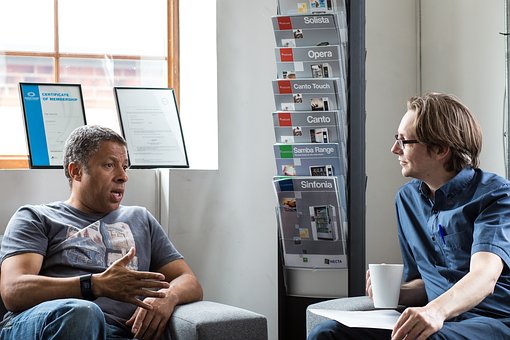Hi, I’m Andrew. You may know me as the support coordinator at the Student Union, but I also volunteer as listening volunteer at the Samaritans. To highlight their #TalkToUs campaign I thought I’d put together my thoughts on listening skills, how I have developed them and how I use this life skill everyday in my work and life.

Listening skills in action
How do you know if you are a good listener?
“You’re not listening to me”. How many times have you said that phrase, had it said to you or even over heard it in the line of Starbucks? Uncountable right? But how many times do we hold up our hands and go “actually your right I am hearing you, but I wasn’t listening”.
The number one thing that Samaritans has taught me is how hard listening really is. Truly listening is a skill, a skill that needs teaching, developing and practicing.
What are listening bad habits?
The Samaritan’s first stage of learning listening is realising bad habits such as
- Looking at a screen – phone, TV, laptop or iPad
- Listening to music – keeping one headphone in maybe
- One Upping – “My interview went well” – “Not as well as mine went, they absolutely Loooooove me”
- Changing the conversation to something you wish to talk about
When we realize the habits, we can start to be aware of them and stop them creeping in. This allows for true communication. Letting them know you are truly listening and not just hearing.
How can listening skills be used at work?
Samaritans has overhauled my understanding of listening and have developed it into a main skill. One that is imperative in my job. I often ask students to speak about very sensitive and personal information – this would not be possible if I do not gain their trust by truly listening to them.
By truly listening in the workplace you can learn more, build rapport, but most importantly it allows you to understand. Understand what is being asked, understand how people are feeling (colleagues and students alike), understand what you can help with, and understand what the conversation is REALLY about.
What does good listening look like?
Some of the listening skills I tend to put into practice include
- Asking open questions – “how did that make you feel” instead of “what happened”
- Summarising – Let the person know that you have heard them “I just really want to make sure I understand you….”
- Showing empathy – “That must have been such a difficult thing to go through” Feel WITH the person not FOR them.
- Reacting – Share their emotion. If they have just told you something really surprising – be surprise. If they just told you something sad – be sad with them. If they just told you some great news – be excited.
I practice many other skills in my work and volunteering; empathy, understanding, being non-judgmental, showing commitment, providing support. But the idea of listening has struck me more simply because the importance and impact it has is often overlooked.
How can volunteering improve my listening skills?
Just being aware of the impact of listening by volunteering for a service that survives on the premise of people wanting someone to listen to them has dramatically changed my behavior at work and in my personal life. We will also make mistakes when listening, the most important thing to do is to be honest, admit that you weren’t listening and ask them to tell you again.
I would encourage anyone who wants to not only improve this skill but really be there to help others to enquire about volunteering for Samaritans. It is the best thing I have done.
Useful Links
- Volunteering with the Samaritans
- The importance of being a good listener and how to do it
- The Wellbeing Centre
